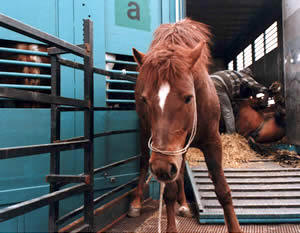 Last year, Valley Meat Co. began a process with the U.S. Department of Agriculture to convert its former cattle slaughter operation into a horse slaughterhouse. This move – made by other would-be horse slaughterhouses as well – is in response to a recent decision by Congress to lift the ban on domestic horse slaughtering. Valley Meat Co. owner Rick De Los Santo says his plant would process horse meat for Russia, Eastern Europe, Asian as well as for pet foods.
Last year, Valley Meat Co. began a process with the U.S. Department of Agriculture to convert its former cattle slaughter operation into a horse slaughterhouse. This move – made by other would-be horse slaughterhouses as well – is in response to a recent decision by Congress to lift the ban on domestic horse slaughtering. Valley Meat Co. owner Rick De Los Santo says his plant would process horse meat for Russia, Eastern Europe, Asian as well as for pet foods.
De Los Santos has also said that since his plans were made public he and his company have been victims of harassment. A newly released video has exasperated the harassment.
The video, filmed last year but released this month, shows a Valley Meat Co. worker leading a healthy horse, by rope, to a spot on the dirt road. He then strokes the horse’s nose, and neck, and says, “All you animal activists, (expletive) you,” then shoots the horse in the head.
The video, De Los Santo says, filmed the process of preparing the hose for consumption, but that the worker only posted part of the video. Per New Mexico Livestock Board law, it’s not illegal for an owner to kill a horse, and horses are considered livestock. It’s no difference as a farmer killing a pig or cow for consumption. Thus, while there have been talks about investigating the incident as animal cruelty, there’s likely no chance of the worker being charged with a form of cruelty.
But that doesn’t stop animal activists, and many others, from declaring the video as disturbing, and adding that the idea of domestic horse slaughtering is just as disturbing, and that Congress should return the ban.
The ban was instituted in 2006, but not strictly as a ban on horse slaughtering, but the ban on the use of federal money to be used toward the inspection of horses headed for slaughter. But without these inspections, the USDA’s Food Safety and Inspection Services requirement that meat undergo federal inspection prior to being distributed as food, created a significant barrier.
The ban was lifted last year.
Despite the controversy swirling around Valley Meat Co., a lawyer for the company has said that the horse slaughterhouse will be opened soon.
“As far as we know … from the Department of Justice and from the USDA, we will be ready to open in the next two weeks,” Valley Meat Company Attorney A. Blair Dunn said.
At least one activist is in favor of the slaughterhouse.
Animal-rights activist Marcy Britton said she openly supports the horse slaughterhouse because overpopulation and abandoned and wild horses leads to starvation. “Death at a slaughterhouse is instantaneous,” she said.
View the unedited video here.






Hey Marcy Britton do you care how many children will be poisoned with tainted horse meat?
Horse
meat is unfit for humans to eat.
Food and Chemical Toxicology, Volume 48, Issue 5, May
2010, Pages 1270-1274
Association of phenylbutazone usage with horses bought for slaughter: A public
health risk
Nicholas Dodman, Nicolas Blondeau, Ann
M. Marini
Inspections, Compliance, Enforcement, and Criminal
Investigations
Ronald Andio, DBA
Patron Farms, LLC 7/9/12
Department
of Health and Human Services
Public Health Service
Food and Drug Administration
Cincinnati District Office
Central Region
6751 Steger Drive
Cincinnati, OH 45237-3097
Telephone: (513) 679-2700
FAX: (513) 679-2761
WARNING LETTER
CIN-12-312058-26
July 9, 2012
Via United
Parcel Service
Mr. Ronald A.
Andio, Owner
Ronald Andio, DBA Patron Farms, LLC
4445 South Turner Road
Canfield, Ohio 44406
Dear Mr.
Andio:
On April 03,
05, and 30, 2012, the U.S. Food and Drug Administration (FDA) conducted an
investigation of your livestock operation located at 4445 South Turner Road, Canfield,
Ohio 44406.
This letter notifies you of the violations of the Federal Food, Drug, and
Cosmetic Act (the FD&C Act) that we found during our investigation of your
operation. You can find the FD&C Act and its associated regulations on
the Internet through links on FDA’s web page at http://www.fda.gov.
We found that
you offered for sale an animal for slaughter as food that was
adulterated. Under section 402(a)(2)(C)(ii) of the FD&C Act, 21 U.S.C.
342(a)(2)(C)(ii), a food is deemed to be adulterated if it bears or contains a
new animal drug that is unsafe under section 512 of the FD&C Act, 21 U.S.C.
360b. Further, under section 402(a)(4) of the FD&C Act, 21 U.S.C.
342(a)(4), a food is deemed to be adulterated if it has been held under insanitary
conditions whereby it may have been rendered injurious to health.
Specifically,
our investigation revealed that on or about August 20, 2011, you sold a bay
thoroughbred gelding horse, identified with back tag (b)(4) (USDA Tag (b)(4)) for slaughter as food. On or
about August 23, 2011, (b)(4) slaughtered this animal. The
Canadian Food Inspection Agency (CFIA) analysis of tissue samples collected
from this animal identified the presence of phenylbutazone at 0.0025 parts per
million (ppm) in the muscle tissue and 0.026 ppm in the kidney tissue and
clenbuterol at 0.0039 ppm in the eye (target tissue). FDA has not
established a tolerance for residues of phenylbutazone and clenbuterol in the
edible tissues of horses. The presence of these drugs in edible tissues from
this animal in these amounts causes the food to be adulterated within the
meaning of section 402(a)(2)(C)(ii) of the Act, 21 U.S.C. § 342(a)(2)(C)(ii).
Our
investigation also found that you hold animals under conditions that are so
inadequate that medicated animals bearing potentially harmful drug residues are
likely to enter the food supply. For example, you failed to inquire about the
medication status of animals purchased for slaughter. Food from animals
held under such conditions is adulterated within the meaning of section
402(a)(4) of the FD&C Act, 21 U.S.C. 342(a)(4).
The violations
listed above are not intended to an all-inclusive list. It is your
responsibility to assure that your operations are in compliance with the
law. As a dealer of animals, you are frequently the individual who
introduces or offers for introduction into interstate commerce, the adulterated
animals. As such, you share responsibility for violating the Federal
Food, Drug and Cosmetic Act. To avoid future illegal residue violations
you should take precautions such as:
1. Implementing
a system to determine from the source of the animals whether the animals has
been medicated and with what drug(s); and
2. If
the animal has been medicated, implementing a system to withhold the animal
from slaughter for an appropriate period of time to deplete potentially
hazardous residues of drugs from edible tissue. If you do not want to
hold the medicated animal then it should not be offered for human food, and it
should be clearly identified and sold as a medicated animal.
You should
take prompt action to correct the violations described in this letter and to
establish procedures to ensure that these violations do not recur. Failure to
do so may result in regulatory action without further notice such as seizure
and/or injunction.
We also note
that the slaughterhouse has on file an Equine Information Document (EID)
certificate (or guarantee) dated August 23, 2011 from the producer stating that
this animal that you sold had not been administered any drugs or vaccines or
treated with any substances not permitted for use in food processing equine in
the last 180 days prior to your purchase of this animal. During our inspection
of your firm, you admitted that you filled out and signed the producer’s name
to this form and did not inquire of the producer the medication status of this
animal. You provided this EID to the dealer who purchased this animal from
you. Providing such a false guaranty is prohibited by section 301(h) of
the FD&C Act, 21 U.S.C. 331(h). You should take appropriate actions to
ensure that this violation does not recur.
You should
notify this office in writing of the steps you have taken to bring your firm
into compliance with the law within fifteen (15) working days of receiving this
letter. Your response should include each step that has been taken or will
be taken to correct the violations and prevent their recurrence. If
corrective action cannot be completed within fifteen (15) working days of
receiving this letter, state the reason for the delay and the time frame within
which the corrections will be completed. Please include copies of any
available documentation demonstrating that corrections have been made.
Your written
response should be sent to Mr. Mark E. Parmon, Compliance Officer, U.S. Food
and Drug Administration, 6751
Steger Drive, Cincinnati, Ohio 45237. If
you have any questions about this letter, please contact Compliance Officer
Mark E. Parmon at (513) 679-2700, Ext. 2162, (513) 679-2773 (fax), or email:[email protected].
Sincerely
yours,
/S/
Paul J.
Teitell
District Director
Cincinnati District
cc: Dr.
Tony Forshey, Acting Chief
Ohio Department of Agriculture
8995 East Main Street
Reynoldsburg, OH 43068-3399
Horse
Owner Survey Shows NSAID Use Trends
In a recent survey, 96% of respondents said they used nonsteroidal anti-inflammatory
drugs (NSAIDs) to control the joint pain and inflammation in horses, and 82%
administer them without always consulting their veterinarian. More than 1,400
horse owners and trainers were surveyed to better understand attitudes toward
NSAIDs, in a project sponsored by Merial, the maker of Equioxx (firocoxib).
http://www.thehorse.com/ViewArticle.aspx?ID=14073
Nonsteroidal
anti-inflammatory drugs – prohibited as well Phenylbutazone, known as
“bute,” is a veterinary drug only label-approved by the Food &
Drug Administration for use by veterinarians in dogs and horses. It has been
associated with debilitating conditions in humans and it is absolutely not
permitted for use in food-producing animals. USDA/FSIS has conducted a special
project to for this drug in selected bovine slaughter plants under federal
inspection. An earlier pilot project by FSIS found traces less than 3% of the
livestock selected for testing, sufficient cause for this special project. There is no tolerance for this drug in
food-producing livestock, and they and their by-products are condemned when it
is detected. Dairy producers must not use this drug in food-producing livestock
and if it is found, those producers will be subject to FDA investigation and
possible prosecution.
It’s been illegal for decades in the USA to use horse meat in dog food because certain breeds of dogs died from it, so it’s unethical to sell horse meat for dog food in foreign countries.
Animal-rights activist Marcy Britton doesn’t know what she’s talking about. first of all, it’s been proven that closing US horse slaughterhouses in 2006- 2007 didn’t increase the rise in abandoned or neglected horses, since the number of US horses sent to slaughter has increased, not decreased. The mortgage crises of 2007 and downturn in the economy caused a temporary problem with people not being able to afford their horses, but that’s already been rectified. In spite of the 2007 economic downturn, big breeders, like the AQHA and Thoroughbred racehorse owners, continued to flood the market with horses because they intentionally overbreed more babies than they can sell to increase the odds of getting a few champions, then they send the ones who don’t make the cut to slaughter as planned. Most slaughtered horses are from AQHA breeders and racehorses.
USDA investigations, including undercover videos, and eye witness testimony from US horse slaughterhouse employees have proven that horses are horribly abused, severely injured, and even die on the hellish truck ride to the slaughterhouse in which they spend at least 24 hours to several days jammed on the truck shoulder-to-shoulder with no food or water and no rest, and some are trampled to death.
Nightmarish abuses occur at the slaughterhouse, including horses whose legs were broken or even torn off on the truck are dragged to the kill box by chains, electric cattle prods are shoved up their rectums to force them to move through the chute, foals are born on the slaughterhouse floor and discarded like trash or trampled to death, horses bleed to death from their injuries at the slaughterhouse, and the horses who have gotten sick on the truck, or are too old or skinny, are rejected by the slaughterhouse and then abandoned by the Killer Buyer to starve to death in the desert, or locked in a pen with no food or water until they die. Last year, 20,000 horses were abandoned by Killer Buyers in the desert to die of starvation after they were rejected by the slaughterhouse.
Because horses are an extremely sensitive fight-or-flight animal, they panic when they hear the screams and smell the blood and carcasses of the other horses so they are terrified out of their minds and fight to escape in the chute and/or kill box, which makes it impossible to restrain their heads and stun them effectively with just one shot of the bolt, which the law says is the maximum number of times you can shoot an animal in the head with the bolt humanely. Many horses keep reviving and have to be shot with bolts through the head 4 to 20 times, and 40% of horses are conscious to experience being hung upside-down by the foot and dismembers and butchered.
So-called horse rescuers have been caught selling horses to slaughter for profit, so Animal-rights activist Marcy Britton one of those? or is she just ignorant? or is she on the payroll of special interest groups who want to profit from horse slaughter? This article is the truth based on USDA documentation, videos, and eye witness testimony from former US slaughterhouse employees, and this info was recently presented to Congress by the bipartisan legislators who introduced the SAFE Act to ban horse slaughter and the transportation of horses for slaughter: http://www.examiner.com/article/horse-slaughter-fact-vs-fiction-part-i Call your legislators in the US House of Representatives and Senate and urge them to co-sponsor and support the Safe American Food Exports (SAFE) Act that bans horse slaughter and transporting horses to slaughter.
I think it is interesting that the one so called animal rights ACTIVIST has actually joined as a Defender and intervenor in Valley Meats’ lawsuit against the USDA. Anyone who does that cannot be for animal rights. Under no circumstances can commercial slaughter of horses be accomplished in a humane way. This fight is not over yet.
If they get their way and our beef supply is contamintated with horse meat then maybe the cattlemen will be happy. They’d all be out of work.
Marcy Britton is flat wrong. There are many videos that reveal horses merely stunned who wake up as their throats are slit to drain blood. It is NOT instantaneous. It is NOT humane – horses are significantly more aware and terrified, creating a ‘dark cutting’ hormone release condition that precludes using the meat for food, than cattle. Overpopulation? Caused by overbreeding and THAT is where this issue would be best solved, not by allowing continued unfettered breeding and enabling a bad but profitable solution to exist as an excuse to ease ‘overpopulation’ and make money for a few unprincipled businesses.
humans also overbred. they have over populated the world to the point where wild animals come into our villages/towns/cities looking for food. some even break into our homes and vehicles. so before telling people to stop breeding their animals people need to stop making so many babies themselves. even if we have to be limited to 1-2 babies per family fine. why should animals have to be cut back on their breeding when people are overbreeding and over populating the earth with more and more humans who have no respect for animals and the environment? today animals have no rights. government says animals have rights but we all know that is a bold face lie. because anyone caught committing animal cruelty of any form would get more than a slap on the wrist and boot up the ass.
I really am enjoying here people’s take on this. The Marcy Britton aspect seems to have a lot of people upset. Bob: your take on overbreeding is near and dear to my heart and I couldn’t agree more, for horses and more many other animals, including dogs. Well said.
Marcy Britton is either grossly ignorant or lying. In either case she is wrong to the point of ridicule. Hey, Marcy, watch this and get back to us, okay. http://www.youtube.com/watch?feature=player_embedded&v=MSI546eTX4o GRAPHIC
Dog food companies stopped using horse meat over 20 years ago and zoos use little to no horse meat any more because of the banned drugs that horses are given as it was making the zoo animals sick!
The EU in July 2013 will start imposing stricter regulations in regards to which horses will be allowed to be slaughtered for human consumption in the European and Asian markets, these restrictions will require all horses going to slaughter to have a complete medical history from birth with all drugs and medications that animal has ever received. American domestic horses and captured mustangs will no longer be allowed to enter the European and Asian markets because they are not tracked from birth for any of the banned drugs and medications and almost all American horses and captured mustangs that get sent to Mexico and Canada for slaughter have all received at least 1 if not more of the drugs and medications that have been banned by the USDA and FDA from being used in any animal intended for human consumption.
HORSE LOVERS…PLEASE READ!!
There are currently no plants in the U. S. that are slaughtering horses for human consumption. These plants closed in 2007. Recently, a law was passed to allow these slaughter plants to re-open. On March 30, 2013, President Obama took the money out of the budget that pays the inspectors of the horse slaughter for human consumption plants. This makes it illegal for slaughtering plants in the U.S. to slaughter horses for human consumption. These are some thoughts, facts and concerns that I have with the horse slaughter industry. Each and every part of me loves horses! They have always been a huge part of my life and I’m very passionate about horses and their well being.
Since these U.S. plants have closed, all horses for slaughter have been sent to either Canada, Mexico, Japan or some other foreign country with little to no regulation. Horses that are sent to these foreign countries are put on single deck trailers in the U.S., trucked to the borders where they are unloaded, stand for hours, sometimes days, then loaded on to double deck semis and hauled for hundreds, sometimes thousands of miles to uninspected plants. Even worse, they are sometimes put in crates on cargo planes and flown to plants in France, Japan and other foreign countries. After a long flight they are then put back on trucks to be hauled to plants with little to no food or water during the entire trip. How many days would a trip from a sale barn in Oklahoma to a plant in Japan or France take? Keep in mind these horses get no feed and very little water during the entire trip. Wouldn’t it be more humane to truck these horses from a sale barn in Oklahoma to a plant in Oklahoma or a surrounding state to reach the exact same fate?
Except for a few that are companions, most horses are mainly bred and raised for pleasure, work, sport and profit. Horses are a livestock animal, just like cattle, hogs, sheep and chickens, which are shown and loved by kids. Slaughtering unwanted horses for human consumption is no different than slaughtering cattle, sheep, chickens, etc. Eating horse meat is a choice. Who are animal rights activists and the government to say it’s wrong and try to stop it? We as Americans have freedom of choice, but our government is going to try to control what other countries consume?
Isn’t the U.S. all about foreign trade? The slaughter horse industry previously brought billions of dollars of foreign money into the U.S., as does the beef, pork and chicken industry, which once again, are all loved by children.
In Mexico horses are killed using a knife stabbing the neck to sever the spine. In the U.S. we use a captive bolt gun or a rifle. Which is more humane? WE CANNOT STOP HORSES FROM BEING CROSSED INTO MEXICO!! We can only create a market in the U.S. to slow it down.
How long would it take for a load of horses to get from a sale barn in Texas to an airport in Canada, then loaded into crates and flown overseas to a foreign plant to reach the same fate as they could have in a plant in Texas? The foreign buyers of these horses only wish them to have water from time to time on their journey so they won’t dehydrate. There is no food or water on trucks or planes, I’m not sure about ships. Some of these horses are shipped out of the country and must remain standing in their own manure, urine covered floor over rough waters. I don’t know how they stay on their feet, especially with shoes on! For you animal rights activists that don’t know what horseshoes are, they ARE NOT NIKES!!
PETA, the Humane Society, Animal Protection of New Mexico, Angels for Animals, Respect 4 Horses, animal rights activists groups, your Congressman, Senators, State Representatives or your President are never going to get this stopped. All each and every one of them are doing is prolonging the inhumane misery, torture and discomfort that is all leading to the same fate in a foreign country. Stop the inhumane treatment these beautiful animals receive during the transportation to foreign plants. The most humane solution to this problem is to keep the horse slaughter for human consumption industry in the U.S. where they are federally regulated.
If you are a horseman, horse lover, animal lover, think about it!! Share if you agree, let me know if you don’t. I would like to know why. If you have a better solution I would love to hear it.
Comments are closed.